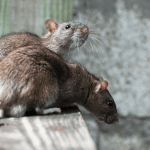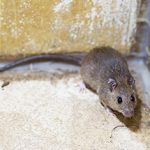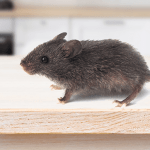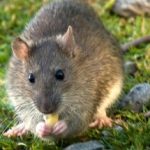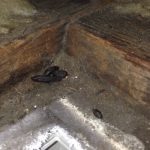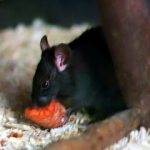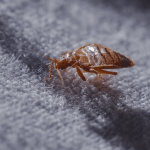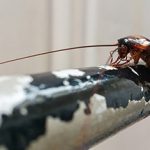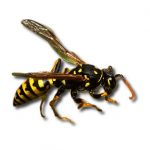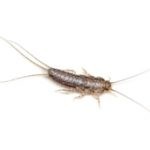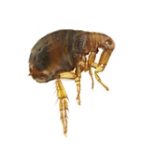What do Rats Eat?
Rats can eat almost anything, from discarded scraps to live prey, and their adaptability is a major reason why they’re so common in urban environments. Food availability is one of the primary reasons for infestations in homes, and knowing what food attracts rats can help you prevent and manage invasions.
Whether you’re curious about what rats eat in the wild, how to bait a trap with the best food to attract them, or want to prevent an infestation by avoiding foods that lure them in, understanding the rat diet is crucial.
Which Food Attracts Rats?
If you’ve ever wondered what a rat’s favorite food is, you’re not alone. The answer often depends on rat species and availability, but high-protein and high-fat foods top the list. While rats aren’t picky, certain foods are especially enticing for them. These include:
- Grains and seeds – cereals, rice, oats, and birdseed are staples in a rat’s diet due to their high carbohydrate content.
- Fruits and vegetables – rats are attracted to sweet fruits like apples, bananas, and berries, as well as vegetables like carrots and corn.
- Nuts and legumes – peanuts, almonds, and sunflower seeds are favored for their fat and protein content.
- Meat and protein sources – while not primary hunters, rats consume meat scraps, insects, and even small animals when available.
- Pet food – dry pet foods left out overnight can be a significant attractant due to their high protein and fat content.
- Garbage and leftovers – unsecured trash bins and food waste provide an easy food source for urban rats.
Rats are highly adaptive eaters. However, understanding their food preferences is key for effective pest control.
What Do Brown Rats Eat?
The brown rat (Rattus norvegicus) is known for its hearty appetite and wide range of food preferences. Its diet often includes:
- Grains
- Seeds and nuts
- Pet food (especially high-protein kibble)
- Birds, eggs, and even small mammals
- Fish and meat scraps
The brown rat has been known to attack even poultry and young lambs. When inside a home, they might often nibble on soap, paper and beeswax. Brown rats are notorious hoarders. They often store excess food in burrows or hidden areas of your home. If you’re trying to figure out the best food to put in a rat trap, protein-rich options like peanut butter or canned pet food are highly effective.
What Do Black Rats Eat?
Black rats (Rattus rattus), or roof rats, are more inclined towards plant-based diets. Common black rat foods include:
- Fruits – especially citrus and bananas.
- Vegetables – leafy greens and root veggies.
- Nuts and seeds – similar to their brown counterparts.
- Grains and breads – often found in kitchens and food storage.
- Insects – occasionally, when plant-based food is scarce.
Black rats are more agile and typically nest in attics or roofs, giving them access to stored grains and pantry items.
Want to prevent rat infestation?
Book professional treatment and keep rats away from your property!
Do Rats Eat Meat?
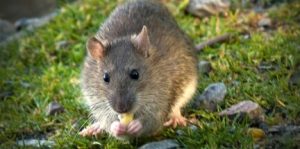
Yes, rats are omnivorous and eat meat when available. They rarely engage in active hunting as they prefer easily accessible food sources. However, when necessary, especially in protein-deficient environments, rats kill and eat small animals such as insects, lizards, and even mice. This behavior is more common in wild or feral rats than in domesticated or urban-dwelling species.
This predatory instinct is a reason why rats and mice don’t infest a house simultaneously – rats may prey on mice, establishing dominance and eliminating competition for resources.
Image by: Mark Turner
Do Rats Store Food?
Rats, like any other rodent in the wild, are food hoarders. They would take more food than they can eat and store it in their burrows for later. Many would eat some of what they find, then hide the rest. They do the same in people’s homes too, which is why very often the smell is not all from the rats, but also from decaying food. They always go out at night to collect whatever they can find in order to avoid predators.
What Do Rats Eat in the Wild?
In their natural habitats, wild rats are opportunistic omnivores, consuming a diverse array of foods to meet their nutritional needs. Their diet is influenced by availability, seasonality, and the specific rat species and includes:
- Fruits and vegetables – wild rats often consume fruits and vegetables available in their environment, such as berries, apples, and leafy greens.
- Nuts and seeds – they are rich in fats and proteins, making them a valuable food source. Rats search for seeds and nuts, including sunflower seeds and acorns.
- Insects and small animals – protein is essential for rats, and they often hunt or scavenge insects like beetles and caterpillars. Some species may also prey on small animals or feed on carrion (dead animals).
- Grains and cereals – grains such as wheat, rice, and corn are commonly consumed by wild rats, especially in areas near human settlements.
- Fungi and plants – in the wild, rats may also eat various fungi and plant parts, including stems and leaves, depending on what’s accessible.
What Food Do Rats Hate the Most?
Knowing which foods rats hate the most can be a game-changer if you’re looking for a natural way to keep them out of your garden or home. While rats are notorious scavengers, there are certain strong-smelling ingredients they avoid. One of the top food products that rats absolutely hate is garlic.
Garlic contains pungent compounds like allicin, which not only overwhelms a rat’s highly sensitive sense of smell but also acts as a natural deterrent. In addition to garlic, other foods and scents that rats tend to dislike include:
- Onion – its strong smell irritates rats’ nasal passages.
- Hot peppers or chili powder – Capsaicin, the active compound in spicy foods, can act as a rodent repellent.
- Cloves – this spice emits a potent aroma that’s unpleasant to rats.
- Strongly scented herbs (like mint or eucalyptus)
- Citrus peels
While these rat-repelling foods won’t harm the rodents, they create an environment that’s far less attractive to them. You can use these natural deterrents as part of a wider pest control strategy that includes sealing entry points, removing food sources, and keeping your outdoor space tidy.
Rats Are Careful Eaters
Rats have managed to survive for so long by not being picky with their food. Since environment changes, so do the food resources of their habitat. This means, they have to adapt to the new thing and this includes the new food. This, however, is not as easy as it sounds. Very often food can make them sick. They have learned how to avoid this, by sampling the new food at first. They try very tiny amounts of it, to make sure they can digest it properly. If they can, they would make the new item a part of their diet.
Will Rats Leave if There is No Food?
Rats seek food, water, and shelter. When these essentials are no longer available, they may seek food elsewhere. However, although a lack of food can influence their behavior, it isn’t always enough to keep them away.
Highly adaptable and opportunistic, rats can survive in challenging environments. Their resilience means they can survive on minimal resources for extended periods. Even in the absence of immediate food sources, several factors can encourage rats to remain:
- Nesting sites – rats seek secure places to build their nests, such as attics, basements, and wall cavities. Once established, they are reluctant to abandon these shelters.
- Water availability – access to water from leaky pipes, pet bowls, or condensation can sustain rats even when food is scarce.
- Nearby food sources – rats often travel long distances to find food, returning to their nests afterwards.
While removing food sources is a crucial step in managing rat populations, it’s often not enough on its own. A combination of sanitation, exclusion, and, when necessary, professional rat control is the most effective approach to ensuring your home remains rodent-free.
How Long Can Rats Live Without Food?
In most cases, rats can survive for up to a week without food, but some can survive for up to two weeks. Of course, it depends on the individual organism which can save some food reserves. However, rats prioritize food over water and will actively seek it out nightly to maintain energy levels and prevent starvation.
Conclusion
Understanding what do rats eat, their favorite foods, and what attracts them gives you an edge in preventing or controlling infestations. Whether you’re choosing the best food to attract rats to a trap or just trying to keep them out of your garden, knowledge of rat food preferences is your best tool.
As a commercial service provider we only aim to inform you about what do rats eat according to the professional experience and knowledge of the pest technicians.



